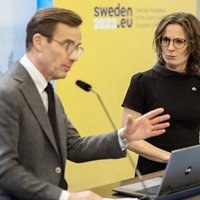(STOCKHOLM) – Sweden took over the Presidency of the Council of the European Union on 1 January, with security its top priority as Europe faces its most serious security crisis since the Second World War.
“Sweden is taking over the Presidency at a time when the European Union is facing unprecedented challenges. A greener, more secure and freer Europe is the foundation of our priorities,” said Prime Minister Ulf Kristersson on 14 December when he presented the priorities of the Swedish presidency to the Riksdag.
Russia’s invasion of Ukraine is a threat to European security, and the Swedish presidency says this has dire consequences for migration, as well as global food and energy supplies.
After security, unity, competitiveness, green and energy transitions, democratic values and the rule of law are the main prioprities for the new presidency.
With Ukraine fighting for its survival as a nation, and for the security and lives of its citizens, the Swedish presidency will prioritise continued economic and military support for Ukraine, as well as support for Ukraine’s path towards the EU.
While much attention will focus on the war in Ukraine, simultaneous attention will be given to efforts to drive economic growth, which remains necessary to meet Europe’s long-term challenges. The presidency will seek to anchor a concerted approach to European competitiveness at the top of the political agenda.
The Swedish presidency will also continue efforts to tackle high and volatile energy prices while addressing long-term energy market reform. It promises to put ‘Fit for 55’ into action and speed up the energy transition.
Finally, upholding the principle of the rule of law and fundamental rights is seen as an essential element of Sweden’s and indeed every Presidency of the Council.
The presidency, which Sweden holds for six months, leads the work in the Council of the EU and represent all 27 Member States in negotiations with other EU institutions. The Swedish presidency will chair approximately 2,000 meetings in Brussels and Luxembourg, and approximately 150 informal meetings will be held in locations throughout Sweden.


